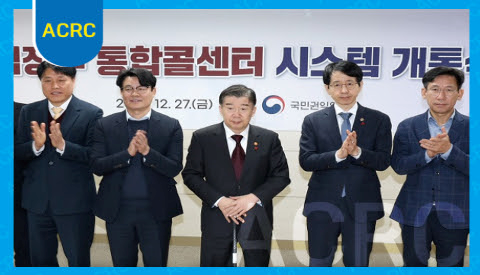LAUNCH OF GOVERNMENT CIVIL COMPLAINT CALL CENTER SERVICE UTILIZING PRIVATE CLOUD AND AI TECHNOLOGY.

- ACRC has fully opened a government-wide integrated call center system based on private cloud technology for 17 government ministries
- Utilizing AI for real-time analysis of counseling content provides customized advice to counselors, offering swift and accurate counseling services to citizens
A service that integrates the civil complaint call center systems of 17 government ministries is officially launching to provide citizens with quicker and more accurate government civil complaint guidance services.
The Anti-Corruption and Civil Rights Commission (ACRC, Chairperson Ryu Chul Whan) has completed the construction of the government-wide integrated call center system and opened it today.
This construction project was conducted using private resource-sharing (cloud) technology and artificial intelligence to enable civil complainants to receive swift and accurate counseling services regarding government civil complaints.
The Commission, in collaboration with 17 institutions, completed this two-year project that began in 2023 and starts the integrated service of the call center systems for the 17 government ministries this December.
* (17 Integrating Institutions): Anti-Corruption and Civil Rights Commission, Ministry of Oceans and Fisheries, Ministry of Agriculture, Food and Rural Affairs, Ministry of Personnel Management, Ministry of Veterans Affairs, Ministry of Food and Drug Safety, Ministry of Culture, Sports and Tourism, Ministry of the Interior and Safety, Korea National Statistical Office
Previously, each government ministry established and operated its own call center system, which raised issues of budget waste, long waiting times for calls, and inconveniences such as having to re-explain consultation content.
In contrast, the government-wide integrated call center system moved away from the previously independent server operation approach of each institution and utilized private resource-sharing (cloud) technology for the first time in government call centers to address these issues.
In the past, when citizens needed to re-consult with advisors from different institutions, they had to re-explain their issues. However, with the shared use of the integrated system, data sharing, such as consultation content between institutions, becomes possible, greatly enhancing accessibility and convenience for citizens.
Furthermore, by introducing the “AI Advisor”* feature, citizens can receive faster and more accurate guidance services.
* This AI technology analyzes the voice of the citizen and advisor in real-time to recommend appropriate responses and consultation knowledge to the advisor.
For this project, 22,875 standard consultation cases from 17 institutions were structured into data. During a phone consultation, the system automatically provides advisors with tailored cases that correspond to the intentions of the questioner, enabling advisors to conduct consultations more easily and conveniently.
Additionally, compared to the previous approach where 17 ministries separately built and operated systems, shared use of the integrated system is expected to result in a budget savings of 84.6 billion KRW.
* Individual system construction à integration and shared use of unified systems resulted in total savings of 84.2 billion KRW
* Annual economic benefits including reduced consultation time through integrated operation and AI introduction amount to 4 billion KRW
At the opening ceremony, attended by over 40 people including Ryu Chul-whan of the ACRC, officials from 17 institutions, the Korea Intelligent Information Society Agency, and the young reporters of the Commission, attendees also visited consultation rooms of Citizen Call 110 and the Meteorological Administration to observe the consultation sites and encourage the advisors.
ACRC chairperson Ryu Chul-whan expressed gratitude to everyone involved in dismantling the barriers between ministries and building the government-wide integrated call center system over the past two years and hoped that the quality of civil complaint consultation services would improve and inter-ministerial cooperation would be strengthened in the future.
He further stated, “Since government call centers serve as the frontline communication channels with the public, I’d like to call for their attentive listening to the voices of the citizens and contribution to connect government policies to alleviate the difficulties faced by the people at the forefront.”
